World Health Assembly urges stronger public health emergency preparedness, WHO response
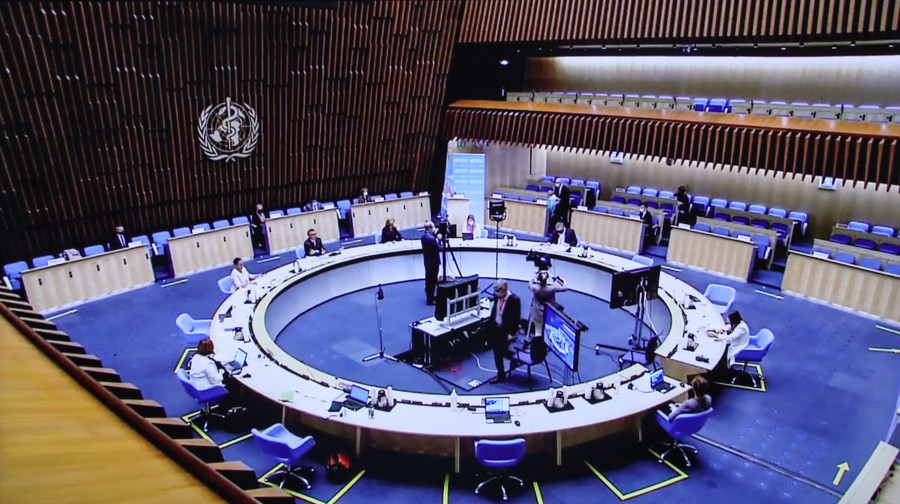
Photo taken in Brussels, Belgium on May 24, 2021 shows the live stream of the 74th World Health Assembly held at the World Health Organization (WHO) headquarters in Geneva, Switzerland. (Xinhua/Zheng Huansong)
The attending countries came to the conclusion that the ongoing COVID-19 pandemic has fully exposed the weaknesses of mankind's health emergency response system at national, regional and global levels.
GENEVA, June 1 (Xinhua) -- The World Health Assembly (WHA) on Monday called on the World Health Organization (WHO) to reinforce its preparedness for and response to public health emergencies worldwide and suggested that a specific working group be established for this purpose.
During the meeting, the attending countries came to the conclusion that the ongoing COVID-19 pandemic has fully exposed the weaknesses of mankind's health emergency response system at national, regional and global levels.
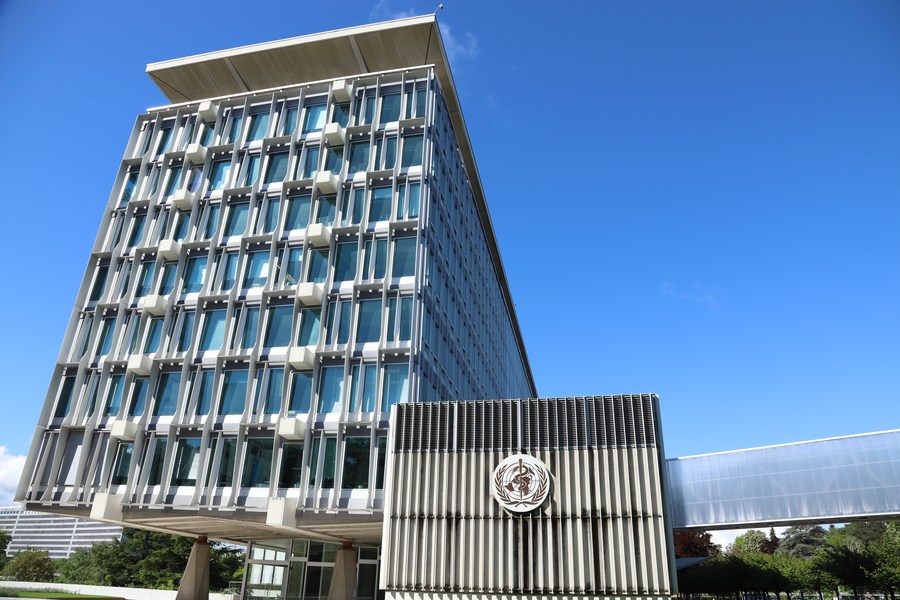
Photo taken on May 20, 2021 shows the World Health Organization (WHO) headquarters in Geneva, Switzerland. (Xinhua/Chen Junxia)
COVID-19 REVEALS SERIOUS SHORTCOMINGS IN PREPAREDNESS
Member states at the WHA agreed that COVID-19 has revealed serious shortcomings in the world's preparedness for timely, effective prevention of potential health emergencies, and its response capability is also in urgent need of improvement.
Before the WHA, the Independent Panel for Pandemic Preparedness and Response (IPPPR), established by WHO Director-General Tedros Adhanom Ghebreyesus, submitted its final main report on the COVID-19 response by the WHO and its member states.
Admitting that COVID-19 was a preventable global disaster, the IPPPR report largely attributes the outbreak of the pandemic to inconsistent and underfunded preparation, which has long been crippled by an alert system too slow and too mild.
"February 2020 was a lost month, when steps could and should have been taken to curtail the epidemic and forestall the pandemic," the panel said, adding that it resulted from two things.
One was that countries did not fully recognize the threat, and the other was that they chose a wait-and-see attitude rather than concerted public health actions, failing to understand how serious the new pathogen could be.
Even after the WHO declared the COVID-19 outbreak as a public health emergency of international concern (PHEIC) on Jan. 30, 2020, a large number of countries still did not adopt a strong containment strategy, which could have forestalled the global pandemic.
Meanwhile, the spread of the pandemic shows that the WHO was underpowered to fully fulfill its duty, and the uncoordinated actions by countries confronting the pandemic have aggravated the inequality in access to response tools, such as personal protection equipment, diagnostic kits, therapeutics and vaccines, which all need global political leadership to address.
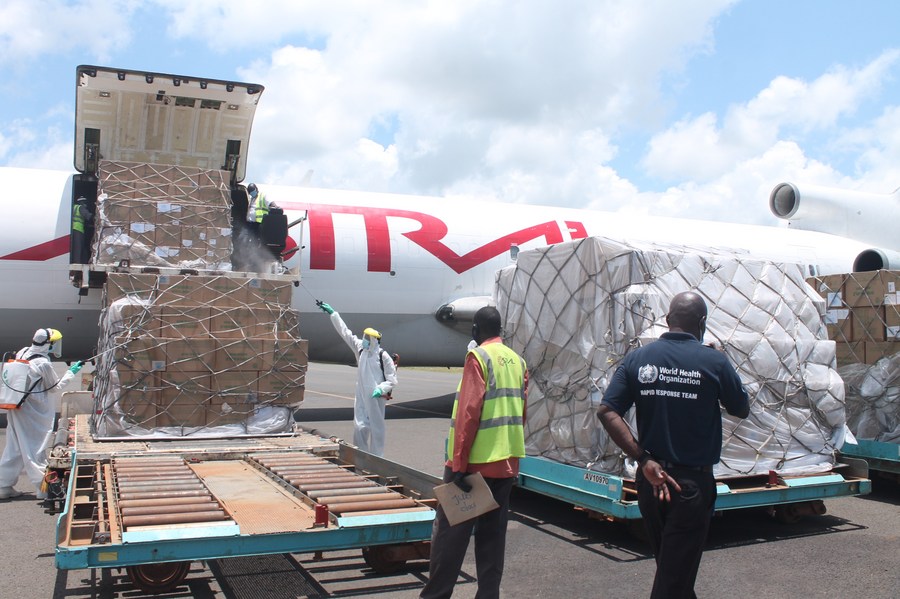
Workers disinfect medical supplies donated by the World Health Organization at Juba International Airport in Juba, South Sudan, on Sept. 4, 2020. (Photo by Gale Julius/Xinhua)
WORKING GROUP TO STRENGTHEN WHO PREPAREDNESS, RESPONSE
The WHA proposed establishing a member states working group on strengthening WHO preparedness for and response to health emergencies. The group will consider the findings and recommendations in three reports submitted respectively by the IPPPR, the International Health Regulations (IHR) Review Committee, and the Independent Oversight and Advisory Committee for the WHO Health Emergencies Program.
Concerning the IHR in particular, the review committee holds that lack of compliance of states with certain obligations under the IHR, particularly on preparedness, has caused the COVID-19 pandemic to evolve into a protracted global health emergency. Hence, it highlighted the need of governmental responsibility to implement the IHR to the highest level.
The committee recommends a robust accountability mechanism for evaluating and improving compliance with IHR obligations to strengthen preparedness, international cooperation and timely notification of public health events.
While urging member states to strengthen their core public health capacities and adopt an all-hazard, multi-sectoral approach in preparedness for health emergencies, the WHA resolution calls on countries to notify WHO of public health events within their territories according to IHR (2005), and continue to convey to the WHO timely, accurate and sufficiently detailed public health information.
One of the priorities of the working group will be undertaking a WHO convention, agreement or other international instruments on pandemic preparedness and response.
The working group is expected to provide a report to a WHA special session scheduled for November, which will be dedicated to establishing an intergovernmental process to draft and negotiate a relevant convention or agreement.
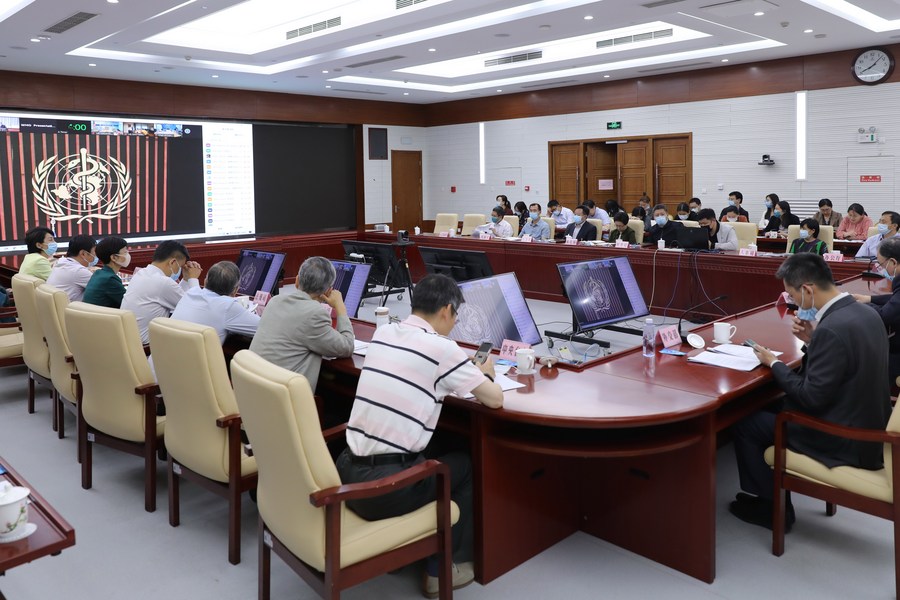
Delegates attend the 74th World Health Assembly (WHA) via video link in Beijing, capital of China, May 24, 2021. (Xinhua/Zhang Yuwei)
NEW MECHANISM BASED ON SOVEREIGN EQUALITY, CONSULTATIONS
Addressing the WHA, Chinese delegate Yang Feng, also deputy director of Health Emergency Response Office affiliated with National Health Commission of China, appreciated the WHO for the tremendous work it has done. Noting that the virus knows no borders and the pandemic no race, he called for global solidarity and cooperation in building a community with a shared future for mankind.
"China agrees with the reports' concept of building 'One Health' surveillance system and the 'whole of government, whole of society' pandemic response approach, which aims at improving the IHR and other international legal systems," he said.
"China believes that promoting the equitable distribution of and access to COVID-19 vaccines globally is crucial to outbreak prevention and control, and has fulfilled its commitment of providing COVID-19 vaccines as a public good by offering medical assistance to 80 countries, exporting vaccines to 43 countries and supplying 300 million doses of vaccines worldwide," he added.
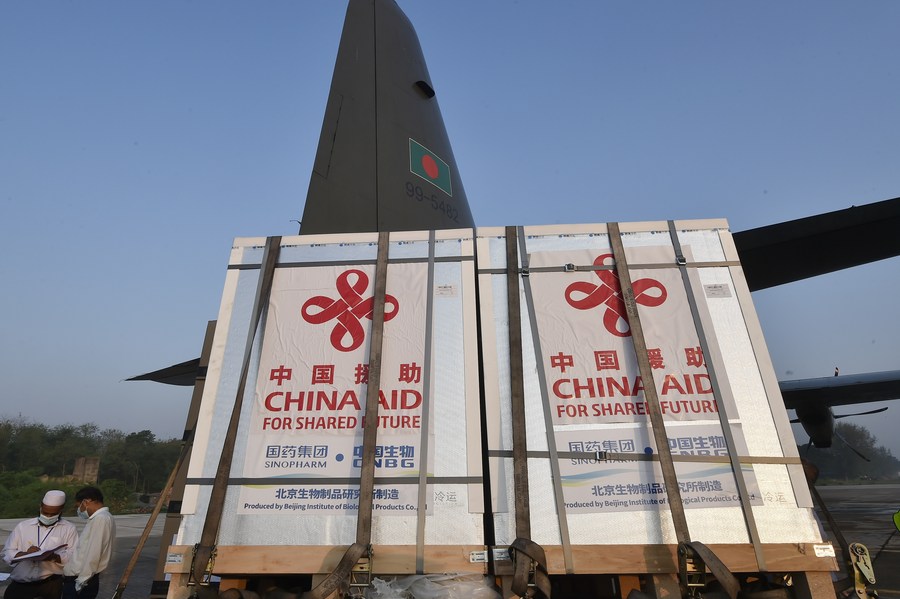
Photo taken on May 12, 2021 shows China-donated COVID-19 vaccines unloaded from a military transport plane in Dhaka, Bangladesh. (Xinhua)
"China will continue to make its own contribution to promoting the accessibility and affordability of vaccines in developing countries," Yang stressed.
He also mentioned that China has noted the recommendation presented in the reports on establishing a new international expert investigation mechanism and a national capacity review mechanism, and generally agrees with it.
"However, we emphasize that the new mechanism must follow the basic principle of sovereign equality, be based on the consensus of relevant States Parties, and require dedicated studies and consultations," he added.
"China also takes note of the recommendation to establish the Global Health Threat Council, takes an open attitude and is ready to work with the international community to study the proposal," Yang noted.
Photos
Related Stories
Copyright © 2021 People's Daily Online. All Rights Reserved.










